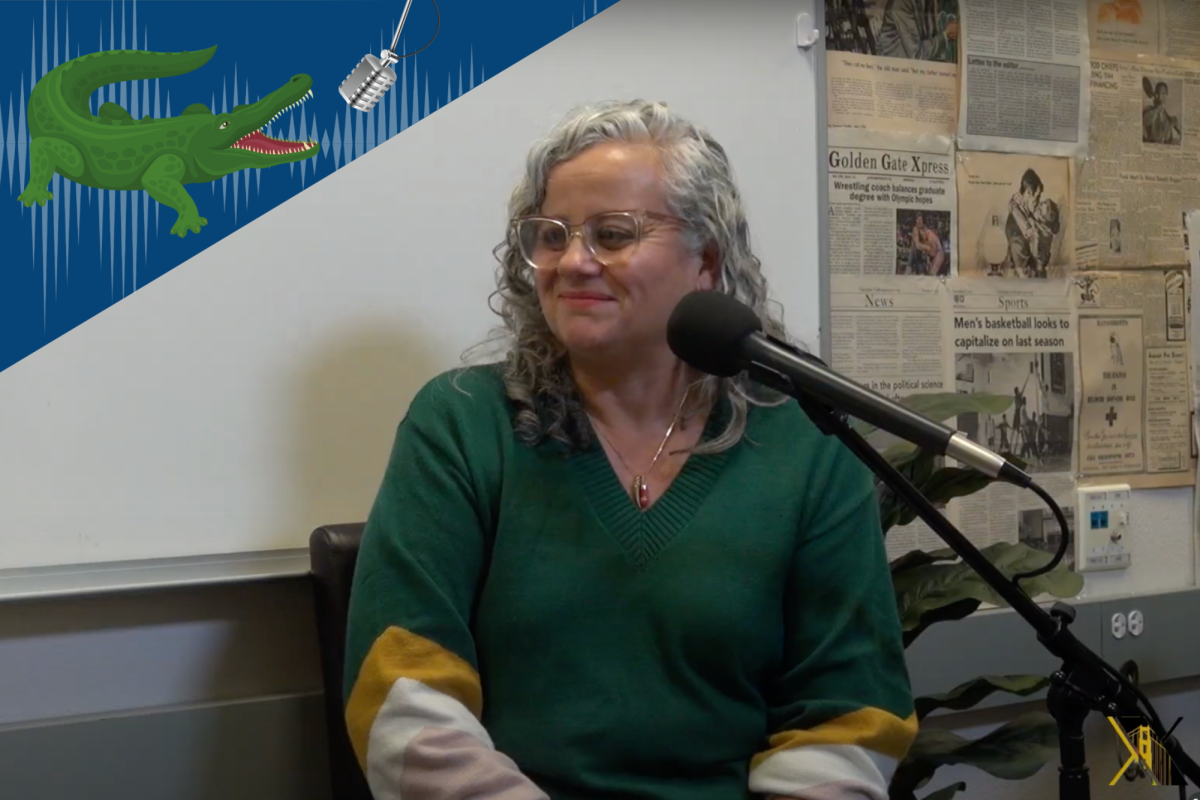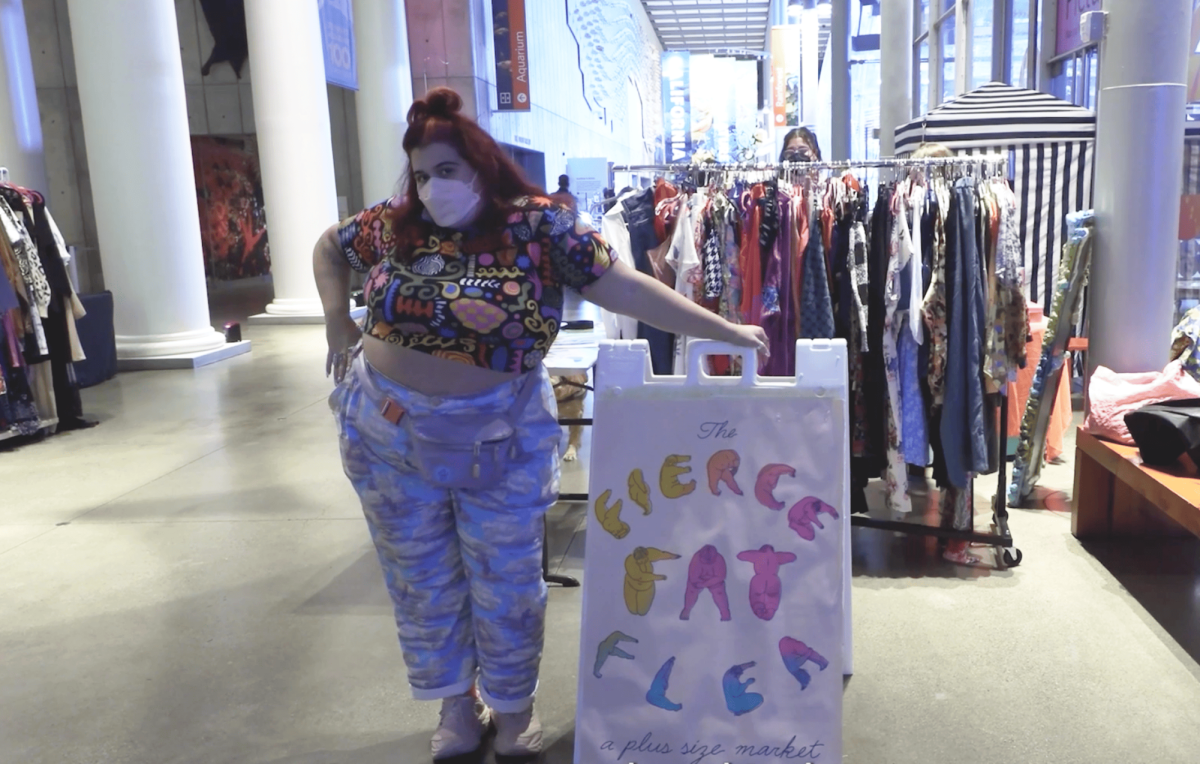Intro
Trevor Schock: 0:00 – 0:44
Hi. Welcome back to Golden Gate Xpress. I’m Trevor Schock, and today we’ll be sitting down with Aaron Kerner, the director of the cinema department at SF State. He has been teaching at the school since 2003 and has authored such books as “Film and the Holocaust,” “Extreme Cinema” and “Torture Porn in the Wake of 9/11,” which discusses the mid-2000s surge of horror movies such as “Saw” and “Hostel.”
In this episode, we do a deep dive on the horror film genre and the theories and subculture surrounding it. This episode includes topics that could be sensitive to some viewers and listeners.
Interview
Trevor Schock: 0:45 – 0:47
How would you define a horror movie?
Aaron Kerner: 0:48 – 1:18
Interesting. Yeah. I mean this is — actually one of the issues is genres in themselves are always these actually very slippery things. We often come to it and we assume that we understand what a genre is and then once you start looking at things, things start to fall apart really, really quickly.
1:19 – 2:25
So in fact, actually one of the points that I make in the torture porn book is that, you know, of course, up to this moment, torture porn enters the scene shortly after 9/11 — 2003, 2004 and when these entered the theater prior to this the expectation — horror up to from like the late ‘70s into the ‘80s, certainly definitely through the ‘80s and even into the ‘90s, the slasher was — that was horror effectively. And so when torture porn came on the scene, a lot of people, whether audiences or critics, didn’t quite know what to do with it because it was not the horror that they remembered or assumed. There’s no boogeyman, there’s no supernatural elements, you know, and so when torture porn came on the scene, it didn’t register necessarily as horror.
2:26 – 2:48
But I think one of the things that critics and audiences missed, of course, is that genre is just as elastic and slippery and evolves and changes and there’s different cycles that come in and out. And so the very concept of genre itself is hard to pin down when you really start to look at it.
Schock: 2:49 – 2:56
What would you say are tropes that people come back to with horror? Like, what are the classic ones you think people talk about?
Kerner: 2:57 – 3:38
Well, I mean, of course, there’s the trope of the monster and the monster can be defined in many, many different ways. Whether it’s like an actual monster or if it’s a kind of monstrous part of humanity or society. There’s often some ways in which the family is messed with — almost always. That’s where horror might actually have some affinities with melodrama. And then, there’s a certain affective experience.
3:39 – 4:14
Again, one of the things that maybe people got upset by is that the torture porn actually doesn’t really rely on things like jumpscares, which the slashers most definitely did. They definitely rely on jump scares. But torture porn very much less so. Torture porn actually might have — in terms of a Venn diagram — might really kind of overlap more with thrillers.
4:15 – 5:06
So messing with family, monsters of various types — in almost every case, horror is referencing some sort of social angst. Whether that was like, horror was responding to the kind of sexual freedoms found in the ‘70s and then the kind of Reagan era sort of fears about the destruction of the family, those sorts of things, of course, torture porn is most definitely responding to that post-9/11 moment.
Schock: 5:07 – 5:19
Torture porn would be defined as — I mean, it’s that late mid to late 2000s trend of, there’s “Saw,” there’s “Hostel.” What else would you say falls into that?
Kerner: 5:20 – 6:10
Yeah. I mean, obviously the name itself. Well, I’ll back up just a little bit. The name itself actually comes from a David Edelstein review. I think the title, if I remember correctly, was “Now Playing at your Local Multiplex: Torture Porn.” That’s where that name comes from so it’s already coming from a kind of a point of derision. The title of the genre is a little bit unfortunate because it already implies that it’s garbage or, you know, less than — I think 2003, 2004 is when the “Saw” short version is released.
6:11 – 6:32
The filmmakers of “Saw,” of course, they were able to make their feature based on that short, and then of course “Hostel.” And so those become, “Hostel” and “Saw” become the kind of model. And then you know, there’s a number of different films that get churned out, based on this sort of model.
6:33 – 7:34
And some of the tropes are: people are contained, often there’s traps, it’s at the hands of, what I call a clinical sadist. The colloquial sense of sadism is that you enjoy watching people get hurt or suffer. That’s a colloquial definition. But actually, the Marquis De Sade from which the term sadism comes from, he was actually responding to the horrors of the Reign of Terror — he was actually responding to this idea of where the enlightenment project goes so astray. So the clinical sense of sadism is following reason to the very end, without ethics — without an ethical check.
7:35 – 8:50
So, perpetrating something under a strict rule… for instance, one of the things that “Saw” presents is Jigsaw is a very, very rational actor. He’s very cool and collected and cerebral. He enacts his traps by some sort of strict code and if you are able to follow the rules exactly as he says, or his acolytes say, then you could presumably escape your trap. Of course, people don’t follow the rules or cheat or don’t understand the rules so bad things happen. But almost always, Jigsaw is operating under these very stoic, reasoned laws or code, and if people violate from that, then they’re in trouble.
8:51 – 10:14
“Hostel” has a similar undertone in terms of Elite Hunting, which is the organization that abducts people [in the film]. They don’t really give a shit about torturing people, they simply provide a service — and there’s very strict rules in terms of how that service is supposed to be, orchestrated or how clients are supposed to act. And so again, there’s very strict codes. And it goes back to this kind of clinical sense of sadism where, you know, again, Sade is responding to the reign of terror where people are being guillotined in the street and Sade — his writing is effectively saying if this is if the enlightenment brings us this — that’s what his writing is talking about. The libertines, the sadists are following rules. Very strict rules. And he’s responding to the enlightenment project that for him, he’s witnessing people being guillotined in the street so he’s responding to that.
Schock: 10:15 – 10:40
You make the point in the book that, I mean, I guess, like the critics were saying that it wasn’t like the old horror movies — that there was this big difference between 80s slashers, whatever the classic horror movies are. Do you think that difference is actually that big between this like more modern version of horror and those slasher movies even?
Kerner: 10:41 – 11:26
Well, sure. I mean, they are different because they’re responding to very different things. Again, much of the fascination in the slasher films is obviously, sexuality, and family structures or the failure of family structures. And these things no longer really resonated in the post-9/11 moment. Torture resonated. More specifically, actually the fear not just of being tortured but that we are the torturers.
11:27 – 12:14
The famous moments in Congress when Dianne Feinstein and John McCain are on the floor talking about the CIA, and acknowledging the problems that materialized in the wake of 9/11 in terms of the CIA’s special rendition program, where people were literally kidnapped off the streets and then taken to the CIA black sites or handed over to fucking Syria to be tortured. There’s a certain sense of not just the fear of being tortured but that, in fact, we’re capable of these things.
Schock: 12:15 – 12:21
What are you drawn to in a horror movie that you like, really love and enjoy? Like, what makes that for you?
Kerner: 12:22 – 13:26
You know, this might be semi-controversial, but I do — I really like Luca Guadagnino’s remake of “Suspiria.” Mia Goth is in that and one of the things that Tilda Swinton refers to in that remake, she refers to it as a cover as in a cover song. And Tilda Swinton’s point is that you know, generally speaking, a band is not going to cover it exactly like the original. So there’s references — like yeah, it’s the same song but different. I think that’s a really beautiful way to think about the remake of “Suspiria.” And I really love the way in which our central character, her position within the narrative is different — I don’t want to spoil anything.
Schock: 13:27 – 13:32
I’ve seen it. We can edit out the spoilers.
Kerner: 13:33 – 14:07
Yeah. You assume that she’s this innocent, particularly if you have knowledge of the original going in, and then you realize oh, crap. And then just the way that it’s shot, the scoring by Thom Yorke, I mean — actually I spent a good deal of time on “Suspiria” in my book “Abject Pleasures” just because it’s an incredibly beautiful film with tons of horror in it.
Schock: 14:08 – 14:18
What do you think of people remaking “Halloween?” How do you feel about the fact that, like Freddy has just gone on for decades and decades and decades?
Kerner: 14:19 – 15:24
Yeah, I mean as I was mentioning before — horror has this tendency to go in cycles really fast. And so I’ve lost track of a lot of these things. I certainly haven’t kept up with the more recent remakes but I actually really did appreciate Rob Zombie’s contributions to the “Halloween” franchise in particular. I think his treatment of Michael was really smart. You know, we get more of a sense of who Michael is and his motivations. I have a certain amount of affection for the Zombie remakes. And again, like [Ti] West, I think obviously Rob Zombie also has a clear understanding and love of cinematic history as well.
Schock: 15:25 – 15:37
Why do you think horror feels like it has such die-hard fans? Like there’s this fandom, it seems a little bit more obsessive than a lot of other film subcultures, I guess.
Kerner: 15:38 – 16:11
I don’t know. Whether explicitly or implicitly, you know, again, the horror genre tends to be interrogating figures of authority and our assumed conventions and the structures of society and our culture. I think there’s a certain, just purely visceral —
16:12 – 16:37
In the same way that some people might really, really love going on roller coasters. There’s some horror fans that just really love the experience of going into whatever movie theater or streaming or whatever but love that thrill of being scared in that moment.
Schock: 16:38 – 16:43
It’s a silly question but if you had five favorite horror movies, what do you feel like they would be?
Kerner: 16:44 – 17:29
Certainly. “Suspiria” as I mentioned and the original “Suspiria.” So, like, those might be the two on top. I also have — the original “Alien.” I mean, that still scares me so much. Particularly when the captain is going through the corridor and it’s right there. It’s right there. Let’s see, two more. I’m sure I’m going to leave the studio here and go “Oh, shit, I should have said that.”
Schock: 17:30
You can text me.
Kerner: 17:31 – 17:59
Yeah. What else? Oh, the Japanese movie “House” which is just so campy and so ridiculous. Let’s see, what’s my last one? You’ll have to stay tuned.
Outro
Schock: 18:00 – 18:05
This has been Trevor Schock for Golden Gate Xpress. Thanks for tuning in and listen in for more episodes.










